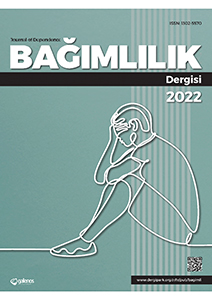Nomofobi, gelişmeleri kaçırma korkusu ve akademik başarı arasındaki ilişki
DOI:
https://doi.org/10.51982/bagimli.1015083Anahtar Kelimeler:
Akademik başarı- FoMO- nomofobi- hemşirelik öğrencisiÖz
Amaç: Bu çalışmanın amacı hemşirelik öğrencilerinde nomofobi ve sosyal gelişmeleri kaçırma korkusu ile akademik performans arasındaki ilişkiyi belirlemektir.
Yöntem: Bu çalışma, Türkiye’de bir üniversitenin Sağlık Bilimleri Fakültesi hemşirelik bölümü öğrencilerinde yürütülen kesitsel bir araştırmadır. Çalışma, Hemşirelik bölümünde eğitim gören 241 katılımcı ile tamamlanmıştır. Veriler; Tanıtıcı Anket Formu, Nomofobi Ölçeği (NMP-Q), Sosyal Gelişmeleri Kaçırma Korkusu Ölçeği (FoMOs) ile toplanmıştır.
Bulgular: Araştırmada hemşirelik öğrencilerinin NMP-Q (73,82±21,27) ve FoMOs (21,36±6,93) puan ortalamalarının orta düzeyde olduğu belirlenmiştir. Araştırmadaki model anlamlı olup değişkenlerden cinsiyet ve gelir durumu, genel puan ortalamasının (GPO) %17’sini açıklamaktadır. Buna göre GPO; erkeklerde 2,4 puan, gelir giderini karşılamayanlarda 0.9 puan daha düşüktür.
Sonuç: Çalışmada NMP-Q ve FoMOs puanlarının orta düzeyde olduğu ve bunların hemşirelik öğrencilerinin akademik başarı düzeyi üzerinde etkili olmadığı saptanmıştır. Ancak günümüzde artan teknoloji kullanımı ve dijital sorunların yarattığı problemlerin ciddiyeti düşünüldüğünde, bu sorunlara karşı önceden tedbir alınmasının etkili bir müdahale olacağı düşünülmektedir.
Referanslar
Elhai JD, Levine JC, Dvorak RD, et al. Fear of missing out, need for touch, anxiety and depression are related to problematic smartphone use. Comput Human Behav 2016; 63: 509-516.
Kaplan Akıllı G, Gezgin DM. Üniversite öğrencilerinin nomofobi düzeyleri ile farklı davranış örüntülerinin arasındaki ilişkilerin incelenmesi. Mehmet Akif Ersoy Üniversitesi Eğitim Fakültesi Dergisi 2016; 40: 51-69.
Lee JH. Future of the smartphone for patients and healthcare providers. Healthc Inform Res 2016; 22(1): 1–2.
Aceto G, Persico V, Pescapé A. The role of ınformation and communication technologies in healthcare: taxonomies, perspectives, and challenges. J Netw Comput Appl 2018; 107: 125-154.
Gutiérrez-Puertas V, Gutiérrez-Puertas L, Aguilera-Manrique G, et al. Nursing students’ perceptions of smartphone use in the clinical care and safety of hospitalised patients. Int J Environ Res and Public Health 2021; 18(3): 1307.
Ramjan LM, Salamonson Y, Batt S, et al. The negative ımpact of smartphone usage on nursing students: An integrative literature review. Nurse Educ. Today 2021; 102: 1-18.
Aditya DS, Suprayitno E. Mobile technology in Indonesian nursing education: Potential and challenge. Jurnal Keperawatan 2021; 12(1): 1-13.
Dayapoglu N, Kavurmaci M, Karaman S. The relationship between the problematic mobile phone use and life satisfaction, loneliness, and academic performance in nursing students. Int J Caring Sci 2016; 9(2): 647652.
Gökler ME, Aydın R, Ünal E, et al. Sosyal ortamlarda gelişmeleri kaçırma korkusu ölçeğinin Türkçe sürümünün geçerlilik ve güvenilirliğinin değerlendirilmesi. Anadolu Psikiyatri Derg 2016; 17(1): 52-59
Kargın M, Türkben Polat H, Coşkun Şimşek D. Evaluation of ınternet addiction and fear of missing out among nursing students. Perspect Psychiatr Care 2020; 56(3): 726-731.
Akturk U, Budak F. The correlation between the perceived social support of nursing students and smartphone addiction. Int J Car Sci 2019; 12(3): 18251836.
Kaniaru D, Karani A, Waithera M. The effect of smartphones use on altering the level of attention and learning styles among undergraduate nursing students in Kenya. Saudi J Nurs Health Care 2020; 3(10): 262-269.
Hoşgör H, Coşkun F, Çalişkan F. Relationship between nomophobia, fear of missing out, and perceived work overload in nurses in Turkey. Perspect Psychiatr Care 2020; 57(3): 1026–1033.
Bülbüloğlu S, Özdemir A, Kapıkıran G, et al. The effect of nomophobic behavior of nurses working at surgical clinics on time management and psychological well-being. J Subst Use 2020; 25(3): 318-323.
Lupo R, Zacchino S, Caldararo C, et al. The use of electronical devices and relative levels of nomophobia within a group of Italian nurses: An observational study. epidemiology, Biostatistics and Public Health 2020; 17(1): e13272-1– e13272-10.
Ma H, Zou JM, Zhong Y, et al. The influence of mobile phone addiction and work procrastination on burnout among newly graduated Chinese nurses. Perspect Psychiatr Care 2021; 57(4): 1798–1805.
Yildirim C, Correia AP. Exploring the dimensions of nomophobia: Development and validation of a self-reported questionnaire. Comput Human Behav 2015; 49: 130-137.
Przybylski AK, Murayama K, DeHaan CR, et al. Motivational, emotional, and behavioral correlates of fear of missing out. Comput Human Behav 2013; 29(4): 1841-1848.
Okuyan C, Döner Güner P, Uslusoy Güneş S. Hemşirelik ve tıp fakültesi öğrencilerinin nomofobi düzeylerinin belirlenmesi. Gümüşhane Üniversitesi Sağlık Bilimleri Dergisi. 2019; 8(4): 372-382.
Márquez-Hernández VV, Gutiérrez-Puertas L, Granados-Gámez G, et al. Problematic mobile phone use, nomophobia and decision-making in nursing students mobile and decision-making in nursing students. Nurse Educ Pract 2020; 49: 1-7.
Gutiérrez-Puertas L, Márquez-Hernández VV, Gutiérrez-Puertas V, et al. The effect of cell phones on attention and learning in nursing students. Comput Inform Nurs 2020; 38(8): 408-414.
Qutishat M, Abu Sharour L. Relationship between fear of missing out and academic performance among Omani university students: A descriptive correlation study. Oman Med J 2019; 34(5): 404–411.
Ashwini KM, Arathi TV, Ramadas D. Effect of smartphone on health: A study on nursing students. International Journal of Nursing Education and Research 2020; 8(4): 432-435.
Gezgin DM, Hamutoglu NB, Sezen-Gultekin G, et al. Relationship between nomophobia and fear of missing out among Turkish university students. Cypriot Journal of Educational Sciences, 2018; 13(4): 549–561.
Hoşgör H, Hoşgör DG. The relationship among nomophobia, fear of missing out and demographic variables: example of the healthcare manager candidates. Curr Addict Res 2019; 3(1): 16-24.
Moreno-Guerrero AJ, Hinojo-Lucena FJ, Trujillo-Torres JM, et al. Nomophobia and the ınfluence of time to rest among nursing students. A descriptive, correlational and predictive research. Nurse Educ Pract 2021; 52: 1-7.
İndir
Yayınlanmış
Sayı
Bölüm
Lisans
Telif Hakkı (c) 2025 Bağımlılık Dergisi

Bu çalışma Creative Commons Attribution-NonCommercial-NoDerivatives 4.0 International License ile lisanslanmıştır.
Dergimiz ve bu internet sitesinin tüm içeriği Creative Commons Atıf-GayriTicari-Türetilemez 4.0 Uluslararası (CC BY-NC-ND 4.0) lisansının şartları ile ruhsatlandırılmıştır. Bu durum, Budapeşte açık erişim girişiminin (BOAI) açık erişim tanımı ile uyumludur. Creative Commons Atıf-GayriTicari-Türetilemez Lisansı, kullanıcıların bir makaleyi kopyalamasına, değiştirmeden dağıtmasına ve nakletmesine ve makalenin ticari olmayan mahiyette kullanılmasına imkan tanımaktadır. CC BY-NC-ND 4.0 lisansı, yazarına uygun şekilde atfedildiği sürece açık erişimli bir makalenin ticari olmayan mahiyette kullanılmasına izin vermektedir.

